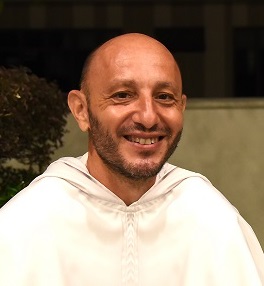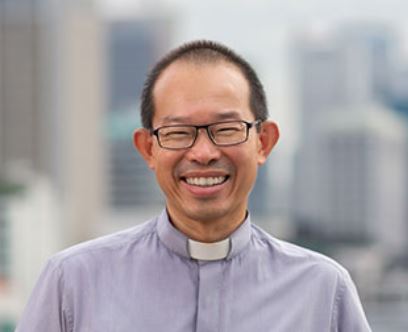Hey Catholics! Go into the whole world!
In his last talk for Extraordinary Mission Month, Fr Kenson Koh explains why and how Pope Benedict XV’s hundred-year-old letter is still relevant today.

Missionaries from A Call To Share (ACTS) with Cambodian beneficiaries after a day of learning and bonding.
Photo: ACTS
In 1919, Pope Benedict XV wrote an apostolic letter, Maximum Illud, describing our duty to be a missionary Church – a momentous holy charge given to us by the Lord. He lists three ways in which each of us can help with encouraging mission in the Church: prayer, vocations, and economic help.
The three ways
The first way is prayer. Nothing can be more important, especially for those of us in charge of mission, or are serving in missionary lands. Pope Francis says, “The heart of the Church’s mission is prayer.” Leave prayer out, and our evangelising and missionary endeavours lose their proper meaning.
When praying for the Church’s intentions, we extend our gaze onto the whole world; we enter personally into the joy and hope, pain and sufferings of our brothers and sisters everywhere. Maximum Illud says that this is one effective way to support missions.
The second way is to foster vocations. In addition to priestly and Religious vocations, this also means lay missionary vocations. An international missionary association called Institute of World Evangelisation – ICPE Mission has been set up for this purpose, and these lay missionaries are present even in Singapore.
Whenever somebody feels that he or she may have a missionary vocation, we need to encourage them and pray for them. In doing so we can truly aid in the mission of our Church, with more people wanting to give their life for its mission.
The last way is economic help. Maximum Illud was written in the aftermath of World War I and its destruction. The Pope pleaded for help for the missionaries and the social endeavours of the Church. We need to show support to our religious brothers and sisters by contributing financially to the various social mission initiatives.
Through Pope Benedict XV’s exhortations to pray, foster vocations and help economically, we can see that the evangelising mission is meant for all the people. Today, we call ourselves missionaries and evangelisers. It is no longer the monopoly of a small group of Catholics, like it was in the past when only priests and Religious could be missionaries. All Catholics are called to the mission of evangelisation. It can be done in one’s own land, even in our homes!
Living our mission
So what can we do to move forward? We first need to learn how to express the truth of Christ to the new generation. To be missionary means that we need to be attached to God and to accept His will. Jesus says, “If you make my word your home, you will indeed be my disciples” (John 8:31).
We must be familiar with the Word of God, so that we know what He wants for us. We can do so by participating in Bible studies or sharings. Not only do we need to know the Word, we also need to live and act it out by looking to the models of holiness and evangelisation – Christ and His apostles. The Gospels and the Acts of the Apostles show that the work of evangelising can be done by people who did not have Jesus physically with them. So, when we are familiar with the Scriptures, we will be aware of how to be missionary.
We can learn the way they preached, acted and loved. A mission of joy and love Pope Francis, in his exultation Evangelii Gaudium, says, “The joy of the Gospel fills the hearts and lives of those who accept Jesus. Those who accept His offer of salvation are set free from sin, sorrow, inner emptiness and loneliness. WithChrist, joy is constantly born anew. In this exultation, I wish to encourage the Christian faithful to embark upon a new chapter of evangelisation marked by this joy.”
We cannot take part in the mission for personal gain. The mission of the Church has no other goal besides saving souls. We need to pray for those who do not know Christ, and those involved in mission work both here and overseas. We also need to work with God and take action to bring the Gospel to people. One way is by introducing RCIA to people who are interested in our faith, and journeying with them. Or, we can go with the religious congregations on their missionary projects.
As Christians, we are first called to love. Love is at the heart of being missionary. If we are involved in parish ministry, we should serve with the attitude of bringing Jesus to others. If we are not, be involved in one! Volunteer to help out in projects that are initiated by the ministries, like visiting the orphanages or bringing clothes, food or books.
Going forth
From the apostolic period, through the medieval ages and the world wars till now, we can see how mission and evangelisation has evolved. The purpose and methodologies used may be different, but the call of the Lord still remains, “Go forth and make disciples of all nations” (Matthew 28:19).
As baptised Catholics, we have the duty to spread the love of Christ to others, and we do so because of the joy of the Gospel in our lives. Let us respond by doing or giving whatever we can to support the mission of the Church, for it is truly in giving that we receive.
This is the third article based on the three-part series of talks by Fr Kenson Koh, held by ONE prior to Extraordinary Mission Month (October 2019) to mark the centenary of Pope Benedict XV’s encyclical Maximum Ilud.


 Clarice Chan, Chairwoman, Original Minds Group
Clarice Chan, Chairwoman, Original Minds Group










 Producer-Presenter, CatholicSG Radio
Producer-Presenter, CatholicSG Radio